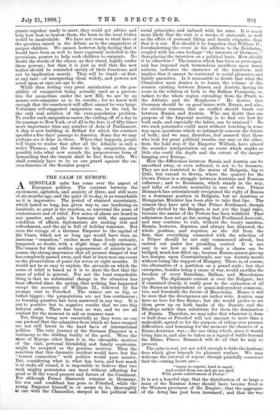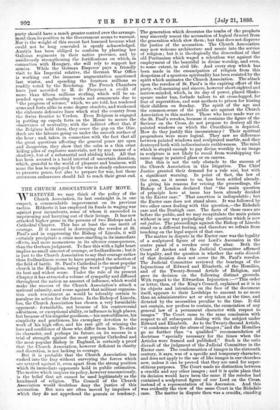THE CALM IN EUROPE.
ASINGULAR calm has come over the aspect of European politics. The contrast between the excitement, agitation, and anxiety of three, and still more of six months ago, and the quiet of to-day, is as remarkable as it is impressive. The period of strained uncertainty, which lasted so long, has given way to one bordering on lassitude, so great is the reaction, so universal the sense of contentment and of relief. Few notes of alarm are heard in any quarter, and, quite in harmony with the apparent condition of affairs, diplomatists are seeking rest and refreshment, and the air is full of holiday rumours. Not even the voyage of a German Emperor to the capital of the Czars, which not so long ago would have been an immense " sensation," excites more than lively curiosity, tempered, no doubt, with a slight tinge of apprehension. The reason for this sudden appeasement of anxiety is, of course, the strong impression that all present danger of war has completely passed away, and that at least men can count on the preservation of peace for seven or eight months. It would not be so easy to explain the grounds on which the sense of relief is based as it is to state the fact that the sense of relief is general. For not the least remarkable thing is that no substantial change in the situation has been effected since the spring, that nothing has happened except the accession of William II., followed by his prompt visit to Peterhof. The armies are as big, or rather bigger ; the preparations are not less continuous ; no burning question has been answered in any way. It is not to positive but to negative results that we owe this halcyon calm. There has been no war, and we are all content for the moment to sail on summer seas.
Yet, things being now essentially as they were, no one can pretend that the calamities from which we have escaped are not still latent in the hard facts of international politics. The very journey of the German Emperor is a testimony to the abiding reality of the peril. Were the state of Europe other than it is, the ostensible motives of the visit, personal friendship and family courtesies, might be accepted as the genuine motives. Then the assertion that this dramatic incident would have but the " loosest connection " with politics would pass muster. But, considering what is, what has been, and how much is at stake all round, it is impossible to believe that two such mighty potentates can meet without affecting for good or ill the vexed present and future of the Continent. For although Prince Bismarck remains in Germany, his son and confidant has gone to Peterhof, while the young Emperor himself is, or seems to be, thoroughly at one with the Chancellor, steeped in his political and social principles, and imbued with his aims. It is much more likely that the visit is a stroke of statecraft, as well as the effect of personal liking and family etiquette, than that it is not. Nor should it be forgotten that William II., foreshadowing the event in his address to the Reichstag, coupled with his own feelings " the interests of Germany.' thus placing the interview on a political basis. How should it be otherwise ? The tension which has been so prolonged, and has imposed such tremendous sacrifices upon many nations, indicates the character of the interview, and implies that it cannot be restricted to social pleasures and family amenities. Is it reasonable to doubt that what the Chancellor most desires is to lessen the volume of dis- sension existing between Russia and Austria, having its roots in the relation of both to the Balkan Peninsula, or, rather, to the whole region extending from the Pruth to the Adriatic and the Bosphorus ? He desires that Germany should be on good terms with Russia, and also, for obvious reasons, that no conflict should break out between Russia and Austria. Who can doubt that one purpose of the Imperial meeting is to find out how far both ends, and especially the latter, can be attained ? No two such potentates could meet without touching in some way upon questions which so intimately concern the future of both ; and we may, therefore, feel assured that those who look for great political results, one way or the other, from the bold step of the Emperor William, have placed the sounder interpretation on an event which marks as little else could the depth and the extent of the danger hanging over Europe.
How the differences between Russia and Austria can be smoothed away, or even softened, is not to be foreseen. They are not restricted to the status of Bulgaria, big -or little, but extend to Servia, where the quarrel for the Crown Prince is a struggle between Austrian and Russian influence ; and to Roumania, which stands in the way, and talks of resolute neutrality in case of war. Prince Bismarck has ostentatiously recognised the right of Russia to a dominant position in Bulgaria, but no Austrian or Hungarian Minister has been able to take that line. The utmost they have said is that Prince Ferdinand, though legally elected by the Bulgars, is not yet the legal ruler, because the assent of the Powers has been withheld. That admission does not go far, seeing that Ferdinand does rule, and may continue to rule, without the treaty sanction. Russia, however, disputes, and always has disputed, the whole position, and requires, as she did from the first, that everything connected with the selection •of a Prince should be not only commenced afresh, but carried out under her presiding control. It is not easy to see how so wide and deep a chasm can be bridged, much less filled up ; because Russia cannot give up her designs upon Constantinople, nor can Austria recede without losing the support of Hungary. There is, of course, the alternative of a partition on a grand scale ; but that enterprise, besides being a cause of war, would sacrifice the freedom of every Danubian, Balkan, and Macedonian people. The diplomatic contest is over the Bulgars ; but if examined closely, it really goes to the extinction of all the States as independent or quasi-independent communi- ties, and forestalls the future of Macedonia. Hence it will be seen that the divergences are rather wide. Austria may have no love for free States ; but she would prefer to see them grow up on both banks of the Danube and .the Rhodope rather than substitute for them the domination . of Russia. Therefore, we may infer that whatever is done or half-done at Peterhof will not amount to more than a. makeshift, agreed to for the purpose of tiding over present difficulties, and lessening for the moment the chances of a Russo-Austrian war,—the one thing which, since it would. bring him in, and also be taken as a signal of battle beyond the Rhine, Prince Bismarck will do all that he may -to prevent. The calm is real, yet not solid enough to hide the lambent fires which glow beneath its pleasant surface. We may welcome the interval of repose, though painfully conscious that the coming hours are—
"vague in vapour, hard to mark ; And round them sea and air are dark With great contrivances of Power."
It is not a hopeful sign that the distribution of so large a mass of the Russian Army should have become fixed in the Western provinces of the Empire ; that the aggregate of the Army has just been increased ; and that the war party should have a much greater control over the arrange- ment than its position in the Government seems to warrant. Nor is the weight of this recent fact lessened because what could not be long concealed is openly acknowledged. Austria has been obliged to conform by planting her Galician regiments in their native province, and by assiduously strengthening the fortifications on which, in connection with Hungary, she will rely to support her armies. While the German Emperor pays a friendly visit to his Imperial relative, the German War Office is working out the immense augmentation sanctioned last winter, and spending the fourteen millions so readily voted by the Reichstag. The French Chambers have just accorded to M. de Freycinet a credit of more than fifteen millions sterling, which will be ex- pended upon engineering works and armaments due to " the progress of science," which, we are told, has rendered arms and forts alike in some degree obsolete, and weakened the elaborate defensive lines which stud the country from the Swiss frontier to Verdun. Even Belgium is engaged in putting up cupola forts on the Meuse to secure the observance of neutrality, with the indirect effect that, if the Belgians hold them, they cover the gap on the Oise. Such are the labours going on under the smooth surface of the hour ; and, taken in connection with the fact that all the great questions affecting the general peace are open and dangerous, they show that the calm is a thin crust hiding piles of explosive materials, not by any means of a shadowy, but of a substantial and abiding kind. All that has been secured is a lucid interval of uncertain duration, which, grateful to the world of pleasure and business, will none the less be employed by the wise in steady endeavours to preserve peace, but also to prepare for war, lest those strenuous endeavours should fail to reach their great end.



































 Previous page
Previous page